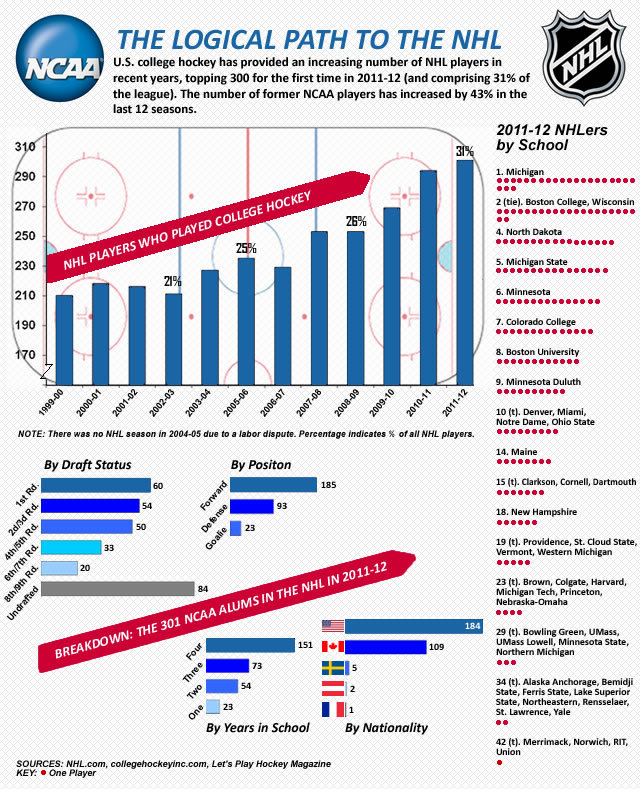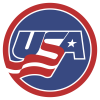NCAA Frequently Asked Questions - College Hockey, Inc.
Frequently Asked Questions
NCAA Recruiting
Q: I am a 16-year-old sophomore in high school and have written numerous emails to college coaches - why haven't any of them written back to me?
A: Division I college hockey coaches are not allowed to initiate contact with prospective student athletes until June 15 of their sophomore year (Grade 10) in high school. That means they cannot reply to emails, text messages, or return phone calls prior to that date.
Q: Is there a way for me to speak with a college coach prior to June 15 of my sophomore year?
A: Yes. You may reach out to college coaches as often as you would like prior to and after June 15 of your sophomore year, but in order to speak with them you must reach them by phone or speak face to face on campus. If you are unable to get them on the phone you should keep trying until you succeed.
Q: Why can't coaches call me back prior to June 15 of my sophomore year?
A: College hockey coaches must comply with NCAA rules, which prohibit coaches in all sports from actively recruiting players at that age.
Q: How do I get noticed by college hockey coaches?
A: College hockey coaches spend a tremendous amount of time and energy scouting and recruiting potential student athletes. If you play for a competitive midget minor, midget major, junior, or high school team, and are an elite player, there is a good a chance that the college coaches know about you.
We highly recommend that American players try out for the USA select festivals that are held in Rochester, N.Y., every summer. We also recommend you make a list of the schools you are interested in and visit their respective web sites and team pages. Most college hockey teams have a "recruiting questionnaire" on their team web site and it would be beneficial to fill out a questionnaire for each school that interests you.
It can also be worthwhile to create a "hockey resume" to introduce yourself to college coaches. Click here for tips on writing a hockey resume.
Q: Where should I play to prepare to play college hockey?
A: More than a dozen junior and high school leagues sent players directly to Division I in 2011-12 - so in simple terms, there is no right answer. If you are good enough, college coaches will find you.
To learn more about the various options, read this story, or click here for links to the various developmental leagues.
Q: Can I go straight from high school and play college hockey?
A: Yes. If a college coach thinks you are physically and mentally prepared for the challenges of college hockey then they will recruit you straight from high school. College coaches will sometimes recommend that a player take an extra year, following his graduation from high school, to play junior hockey so that player can mature both physically and mentally prior to jumping into the college game.
Q: What is the difference between an official college visit and unofficial visit?
A: An official college visit is a 48-hour, expense-paid visit. An official visit cannot be taken until the first day of classes of the prospective student-athlete's senior year in high school. A student athlete is allowed (5) five total official visits but only (1) one per school. An unofficial visit is paid for by the student athlete, can take place at any time and can last any length of time. There is no limit to the number of unofficial visits a student can take. During an unofficial visit the coaching staff may meet with a prospective student athlete and provide him with a tour of the campus and facilities. Read this story for more about the benefits of unofficial visits.
Q: What kind of grades do I need to play college hockey?
A: In order for a prospective student athlete to be academically eligible to play in the NCAA he must have graduated from high school, fulfilled a core curriculum of at least 16 courses, and met a minimum index score that combines standardized tests scores (SAT, ACT) and GPA. A prospective student athlete should regularly meet with a college counselor, provided by their high school, in order to ensure they meet these requirements. All certified high school college counselors should be familiar with the necessary steps and minimum requirements set forth by the NCAA.
Q: What's the 21-year-old rule?
A: If you play a junior A hockey game after your 21st birthday you will lose one year of NCAA athletic eligibility, leaving you with three years remaining (this rule applies only to Division I competition).
Q: What is the NCAA Eligibility Center (or clearinghouse)?
A: The NCAA Eligibility Center, often referred to as the "clearinghouse", certifies the academic and amateur credentials of all college-bound student-athletes who wish to compete in NCAA Division I or II athletics. Prospective student-athletes should register at eligibilitycenter.org by 11th grade to help ensure that they are on the right path to qualify academically. Click here for more information on NCAA eligibility.
Q: I need to take the SATs. Where can I find more information about them?
A: The SAT is a standardized test used by colleges and the NCAA to help determine college admission and eligibility. Visit the College Board web site for more information on the SAT, including test dates, registration and study guides. Many companies offer customized tutoring or instructional books to help students prepare to take the SATs.
Some schools also accept the ACT, another form of standardized test. Click here for more information on the ACT.
Major Junior and NCAA Eligibility
Q: I was recently drafted by a team from the CHL (which includes the OHL, WHL, and QMJHL) and they want me to sign a contract immediately. Is it okay for me to sign a contract even though I won't play for them this year?
A: No. Signing a contract with any professional team (that includes Canadian major junior teams) results in the loss of NCAA eligibility even if you never play a game for that team.
Q: I have been invited by a CHL team to their Rookie/Training camp and they have offered to pay for all my expenses, will this affect my eligibility?
A: You can attend (1) one, 48-hour, expense-paid visit per professional team. The 48-hour period begins when you arrive at the team's facility and ends exactly 48 hours later. While in attendance the team can supply you with expenses that include travel, hotel, food, equipment, and all costs associated with practice and off-ice training. You must leave the facility once the 48-hour time period has expired in order to receive an expense paid return trip home.
Click here for a checklist of all you need to know before attending a CHL camp.
Q: Can I stay at a CHL rookie/training camp longer than 48 hours?
A: Yes, provided you cover the cost of all expenses incurred, including cost for the return trip home, following the initial 48-hour time period.
Q: I attended rookie camp for a particular CHL team and now that same team has asked me to attend their main camp as well - will this affect my NCAA eligibility?
A: If the team covered your expenses at the rookie camp then you must cover your expenses at the main camp in order to remain eligible for NCAA hockey. You are only allowed to accept (1) one 48-hour expense paid visit/tryout per CHL team.
Q: I am going to a CHL camp and we are scrimmaging another team - Can I play in the scrimmage?
A: No. While in attendance at a CHL camp/tryout, you may not participate in any scrimmages or exhibition games against outside teams. You may participate in an intra-squad scrimmage (i.e. a blue and white game).
Q: I was drafted in the in CHL and received a jersey, hat, and t-shirt in the mail - am I allowed to keep these items?
A: No, you cannot accept jerseys, hats, t-shirts, or any material benefits from professional teams without paying for them. If you have received items in the mail your options are as follows: Mail it back or send payment for the items received and request a receipt.
Family Advisors
Q: How do I hire a family advisor? And who should I hire?
A: A family advisor can be a helpful and informative resource, but it is not necessary that you have one unless you are a player who is projected to be drafted in the NHL. If you are going to make a decision on an advisor we recommend you interview at least a few different advisors and as a family decide who you feel most comfortable with. We urge you to contact College Hockey, Inc. and use us as a resource at anytime while deciding on an advisor.
NHL
Q: Can I attend a testing session with an NHL team and retain my college eligibility?
A: NCAA regulations allow student-athletes (or prospective student-athletes) to take part in one testing or tryout session per NHL team, at the team's expense, for up to 48 hours. An exception is if a player takes part in the NHL Draft Combine or the NHL Research and Development Camp - those events are considered tryouts for all 30 teams. A player could participate in another tryout beyond those events, but would need to pay his own way.
Q: Can I attend an NHL team's summer development camp?
A: NCAA players may attend NHL summer development camps, or prospect camps, but must pay their own way (transportation, lodging, food, etc.).
Athletic Scholarships
Q: What are athletic scholarships?
A: An athletic scholarship is financial aid from a university or college based in any degree on the athletic ability of the student-athlete. Athletic scholarships are formalized by entering into agreements called "National Letters of Intent," which is a written agreement between the institution and the student-athlete.
Q: What is a "National Letter of Intent"?
A: The National Letter of Intent (NLI) is the name of the document that formalizes an athletic scholarship. It is a binding agreement between a student-athlete and a university in which the university agrees to provide athletic aid in exchange for the student-athlete's agreement to attend the university.
Q: What is a verbal commitment?
A: A verbal commitment is a non-binding agreement between a prospect and a coach to attend that coach's institution.
Q: What is covered by an athletic scholarship?
A: Funds for tuition and fees, books, room and board, and certain other expenses. The only required expense that a full athletic scholarship cannot cover is transportation to and from campus.
Q: Are scholarships guaranteed for four years?
A: Thanks to a change in NCAA rules in 2011, scholarship agreements may be made for anywhere from one to five years.
Signing a National Letter of Intent, even for a scholarship promised for four years, commits a student-athlete to that school for one year.
Even those scholarship agreements made for one season are almost always renewed annually; they are very rarely cancelled and never for on-ice performance.
Q: Can athletic scholarships be cancelled if I play badly or the coach doesn't like me?
A: Athletic scholarships may not be reduced or cancelled year-to-year based on your ability or performance, because an injury prevents you from participating or for any other athletic reason.
If you are receiving an athletic scholarship, the scholarship may be reduced or cancelled only if you:
- render yourself ineligible for NCAA competition;
- misrepresented any information on your application, letter of intent or financial aid agreement;
- commit serious misconduct which warrants a substantial disciplinary penalty; or
- voluntarily quit the team for personal reasons.
Q: Who decides if I get a scholarship?
A: Although admissions offices can refuse the admission of any student, thereby effectively refusing an athletic scholarship, coaches and athletic departments typically have a good sense of what to expect from their admissions office. This allows coaches to scout and recruit players who they can reasonably expect to earn admission.
Q: Does every student-athlete receive a 100% or "full" scholarship?
A: Universities are permitted to grant 18 "full" scholarships and typically carry around 26 players, so not all are on full scholarships. In other words, most NCAA teams have some players who receive only a portion of their expenses in athletic scholarship (i.e. partial scholarship) and some players who receive all of their expenses in scholarship (i.e. full scholarship).
Financial Aid
Q: What is financial aid?
A: Financial aid is a grant from the university that is not based on athletic ability or participation on an athletic team.
Q: What is covered by financial aid?
A: Financial aid can be granted for tuition and fees, room and board, books and transportation.
Q: How do universities determine the amount of financial aid granted?
A: Although determining financial aid varies between universities, it is typically calculated based on the student and his parents' ability to contribute to the cost of post-secondary education. This is determined by evaluating the current savings and expected earnings of the student over the summer and the student's parents' overall wealth (i.e. earnings, savings, investments, etc.). Based on these types of criteria, the institution makes a judgment on the amount that the student and parents are able to contribute toward a university education. In theory, any shortfall between the expected contribution and the expected university expenses is covered by financial aid.

The information provided herein by Kyle Lawson, Director of Education and Recruitment, College Hockey, Inc. – https://collegehockeyinc.com/













